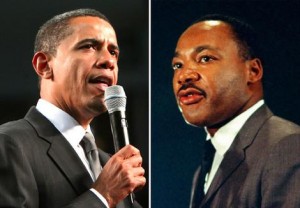(Akiit.com) There are certain moments in time when the weight of history is more noticeably acknowledged than at others. Many of us felt that weight last week as we listened to what would be President Barak Obama’s last State of The Union Address.
The substance of the speech was not that remarkable. It contained the usual panoply of lame platitudes, self-congratulatory rattling, and veiled partisan sniping usually associated with speeches given by outgoing two-term Presidents. But there was one phrase that Obama uttered towards the end of the speech that brought the moment’s full gravitas to bear, though its significance was all but lost amidst a summation rife with canned rhetoric. Obama invoked Dr. Martin Luther King in a call for a new American politics in which “unarmed truth and unconditional love will have the final word.”
There it was. A signal. It was one of those moments when it all hit  you. Here we are in America, almost fifty years after Dr. King’s assassination – a moment that signified the beginning of the decline of the civil rights movement in the eyes of many – and an American black President is addressing the nation for the eight time, having almost completed his second term in office. Although the recent poll numbers do not necessarily reflect his overall popularity, Obama is clearly one of the most revered and beloved figures in America.
you. Here we are in America, almost fifty years after Dr. King’s assassination – a moment that signified the beginning of the decline of the civil rights movement in the eyes of many – and an American black President is addressing the nation for the eight time, having almost completed his second term in office. Although the recent poll numbers do not necessarily reflect his overall popularity, Obama is clearly one of the most revered and beloved figures in America.
But like Dr. King, who is posthumously revered by all, Obama is a deeply polarizing figure. And like Dr. King, he is polarizing as much for what he represents as for anything he has actually accomplished. When Dr. King uttered those words in 1964 as he received the Nobel Peace Prize, America was a deeply divided nation. The struggle to overturn de jure segregation had become decidedly uncivil, characterized by vicious state-sanctioned reprisals and even more brutal acts of domestic terrorism against those brave souls who dared challenge the status-quo.
Dr. King’s Nobel acceptance speech has been mined endlessly for its rich veins of rhetorical gold. But one of the central rhetorical questions he posed was – how can one award a Peace Prize to a struggle for justice that has not yet achieved its objectives? And the answer to that question, given over the course of the speech was this: The Nobel Peace Prize was warranted, not so much because of the success of the civil rights movement in meeting its goals, but because of the moral saliency of its methods. The means the civil rights movement used to try and achieve justice – nonviolent political actions – were ends in themselves, and deserved praise.
In calling for a new American politics that sheds the spirit of extreme divisiveness, Obama harkened both King’s question and his own place in the pantheon of historical figures. Love him or hate him, no one can deny that Barack Obama is one of the most unique and fascinating individuals America has ever known. And like, Dr. King, Obama finds value not as much in his accomplishments, but in how his efforts to tackle the thorny problems of the day reflect both on his own legacy and our nation’s character. Who we are, he believes, should ways be reflected in what we do.
What Obama represents will be left up to posterity to fully compute. But at a very minimum Obama represents the capacity of Americans to adapt to change, and to continually challenge the cynical assumptions and Machiavellian calculations that often define the territory of political power. Obama’s ideals bring into question what it really means to be powerful. Is power only about exerting superior force against an opposing object and causing it to yield? Or can power be about converting an enemy’s energy of hate into love and thus resolving an impasse in a way in which all sides benefit?
Obama likes to believe that he can wield such powers of alchemy. Many of his political opponents and supporters alike have dismissed such ideals as naively fanciful and best, and dangerously impractical at worst. So did Dr. King’s detractors. Those who opposed him believed that by arguing for a colorblind society, he would cause the radical disintegration of a tacit truce that had endured – although with fraying strands – since the civil war. Many of King’s more radical supporters felt that he should dispense with his broad, principled, stand against injustice and focus explicitly on matters of proximate concern to black Americans.
Dr. King and Obama both knew that change is both inevitable, and pivotal to the arc of progress. And they were both well aware of the weight of the historical moment they occupied. In doing so, they embraced the perils and opportunities of momentous change with a silent conviction; clear-eyed, confident, and undaunted by the noise and vitriol surrounding them. They both practiced what they preached: a theology of hope.
Columnist; Armstrong Williams
Official website; http://www.armstrongwilliams.com









Leave a Reply